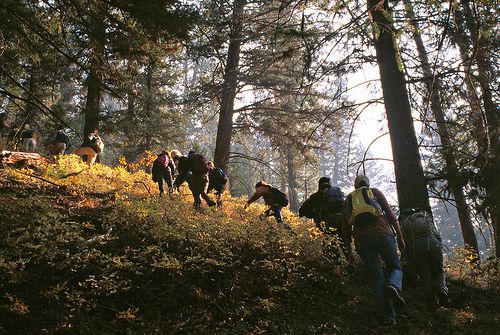
By Jerry D. Mathes II
“April is the cruelest month”
—T. S. Eliot, The Wasteland
Under a 700-year-old ponderosa pine, I rolled from my sleeping bag. The boot steps of a line of strangers tramping the forest floor had woken me. My two brothers, like caterpillars trapped in their chrysalides, didn’t move. Some fifty yards upstream our father, between jobs, had taken refuge in an uncle’s one-room cabin in a church camp where he and my mother and sister slept. When school let out he’d drive us to a mine in California and eventually another lay-off notice, but for that moment he had faith it’d work out. I had no idea, then, what the people trekking past were up to. In the pre-dawn the worshippers climbed the trail, trying to beat the sun to the mountaintop. None stopped to offer me a hand up, only puzzled stares in their haste through the gray light of the darkened forest.
When my oldest daughter, Sophia, turned four she wore a bright blue and yellow dress, ready for the symphony’s Easter show after cake and ice cream. We lived on the banks of the Snake River in a fifth wheel camper. In a month we’d be in Winnemucca where I would fight wildfires until summer’s end then roll to North Carolina and grad school, hoping for a future free from the desperate wandering in uncertain deserts. Sophia smiled in anticipation of being engulfed in the music of the choir, letting it wash over her like the wind of angels suddenly taking wing. We all had a child’s faith that we knew where we were going.
From the back in the dark the lit stage looked like the light at the end of the tunnel with the glossolalia of music rushing over the people in the darkness.
The parishioners sang as the sun rose over the partly dug-up backyard with lumber and masonry scattered about waiting for remodeling. A He-has-risen hymn from the Hallelujah choir of neighbors filled the suburb. Sophia had turned eleven, and I worked halfway across the country, hoping to bring her and her younger sister, Madison, there if things worked out. I hung on the outskirts of the congregation by a willow weeping, its new buds blooming. Invited by Arika, my drinking buddy, I had entered the garden a stranger in the half-light. She said it’d be low-key with a potluck afterward. An unbeliever, I stood surrounded by all the faithful in a backyard next to a drained pond waiting to be filled.
The pine scent hugged the ground like mist in the early morning. The last worshipper having disappeared into the trees, I rolled myself tighter into the sleeping bag to seal out the light and cold. Sunday morning and Spring Break still unwound out ahead of me. I’d wander in the woods, turned loose to find my own way in the labyrinth of ravines and peaks. In May we’d ride the old red truck into the California desert and find respite in the shade of a slagheap and a pit mine, grinding and sifting the earth’s guts into iron ore. In the forest, I huddled alone against the chilled morning, waiting for the day to warm.
Two daughters searching for Easter eggs with grassy baskets and the carnage of chocolate rabbits decapitated and eaten in an addict’s frenzy. Oh the horror of idolatry.
Sophia liked to sit in the back row. I didn’t mind. If she wanted to leave or go to the bathroom we wouldn’t bother anybody. From the back in the dark the lit stage looked like the light at the end of the tunnel with the glossolalia of music rushing over the people in the darkness. Afterward we wandered among the crowd. People we’d never met commented on Sophia’s beauty, whether the light shining in her hair or her smile or her dress and she’d say, “Today’s my birthday. I was born today.”
We left the backyard morning service. We stopped by a convenience store and bought beer to drink before the big lunch spread. Arika had brought her pot-lucking clothes to change into at my apartment, and I selected some down-and-out-English-teacher-in-Texas attire. We waited in our own time zones–my mind always in the Northwest, wandering to two daughters searching for Easter eggs with grassy baskets and the carnage of chocolate rabbits decapitated and eaten in an addict’s frenzy. Oh the horror of idolatry. My girls would never see the rolling piney woods of East Texas with me. I’d be moving on, come May, searching for work again. I closed my eyes against the light when Arika said, “We’d better go, Mister Jerry, if we want to eat.” I drank another bottle. We arrived late and tipsy. Hunger gnawed my guts, gurgling with beer. Easter brings a special kind of despair. I performed the liturgy of the lonely: the ritual nods and mumbled hellos, small talk amongst strangers, creating distance and crafting absence, wondering when I’d get home.
Jerry D. Mathes II is a Jack Kent Cooke Scholar alumnus, author of The Journal West: Poems and an essay collection, Fever and Guts: A Symphony. Caxton Press will release his memoir, Ahead of the Flaming Front, about his experiences fighting wildfire, in 2013. He has received Special Mention for Fiction in The Pushcart Prize XXXI, XXXIV, and XXXV along with several other nominations, had an essay listed as notable in Best American Essays, a story listed as notable in Best of the West, as well as other awards. He taught the Southernmost Writers Workshop in the World at Amundsen-Scott South Pole Station, Antarctica during the 2009-2010 and 2011-2012 Austral summer seasons where he worked in logistics, and taught creative writing at the University of Idaho and Stephen F. Austin State. He loves his two daughters very much.
